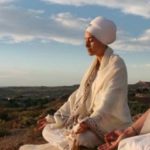Remember, the clairvoyant consciousness of the person in the bardo of becoming is seven times clearer than in life. This can bring them either great suffering or great benefit.
So it is essential that after someone you love has dies, you are as aware as possible in all your behaviour, so as not to disturb them or hurt them. For when the dead person returns to those left behind, or those invited to practice on their behalf, they are able, in their new state of being, not only to see what is going on but to read minds directly. If relatives are only scheming and quarreling about how to divide up their possessions, only talking and thinking of attachment and aversion, with no real love for the dead person, this can cause them intense anger and hurt or disillusion, and they will then be drawn by these turbulent emotions into an unfortunate rebirth.
For example, imagine if a dead person saw spiritual practitioners supposedly practicing for him but with no sincere thought in their minds for his benefit, and with their minds preoccupied with trivial distractions; the dead person could lose any faith he might ever have had. Imagine to if a dead person had to watch her loved ones distraught and helpless with grief; it could plunge her into deep grief also. And if a dead person were to discover, for example, that relatives only made a show of loving her because of her money, she could become so painfully disillusioned that she returned as a ghost to haunt the inheritor of her wealth. You can see now that what you do and how you think and how you behave after people have died can be of crucial importance, and have a far greater impact on their future than you can possibly imagine. You will see now why it is absolutely essential for the peace of mind of the dead person that those who are left behind should be harmonious. This is why in Tibet, when all the friends and relatives of the dead person assembled, they were encouraged to practice together and to say, as much as possible, a mantra such as Om Mani Padme Hum. This is something that everyone in Tibet could do and knew would definitely help the dead person, and which inspired them all to an act of fervent communal prayer.
The clairvoyance of the dead person in the bardo of becoming is also what makes the practice done by a master or experienced spiritual practitioner on his or her behalf of such exceptional benefit.
What a master does is to rest in the primordial state of Rigpa, the nature of mind, and invoke the mental body of the dead person roaming in the bardo of becoming. When the mental body comes into the master’s presence, through the power of meditation, he or she can point out the essential nature of Rigpa. Through the power its clairvoyance, the bardo being then can see directly into the master’s wisdom mind, and so there and then be introduced to the nature of mind and be liberated.
Whatever practice an ordinary practitioner can do as well for a close friend who has died can, for the same reason, be of enormous help. You might do the practice for example, of the Hundred Peaceful and Wrathful Deities associated with the Tibetan Book of the Dead, or you might simply rest in a steady state of compassion; especially if you then invoke the dead person and invite him or her into the heart-core of your practice, it can be of immense benefit.
Whenever Buddhist practitioners die we inform their master, all their spiritual teachers, and their spiritual friends, so they can immediately start practicing for them. Usually I collect the names of people who have died and send them to great masters I know in India and the Himalayas. Every few weeks they will include them in a purification practice, and once a year in a ten-day intensive group practice in the monasteries.








